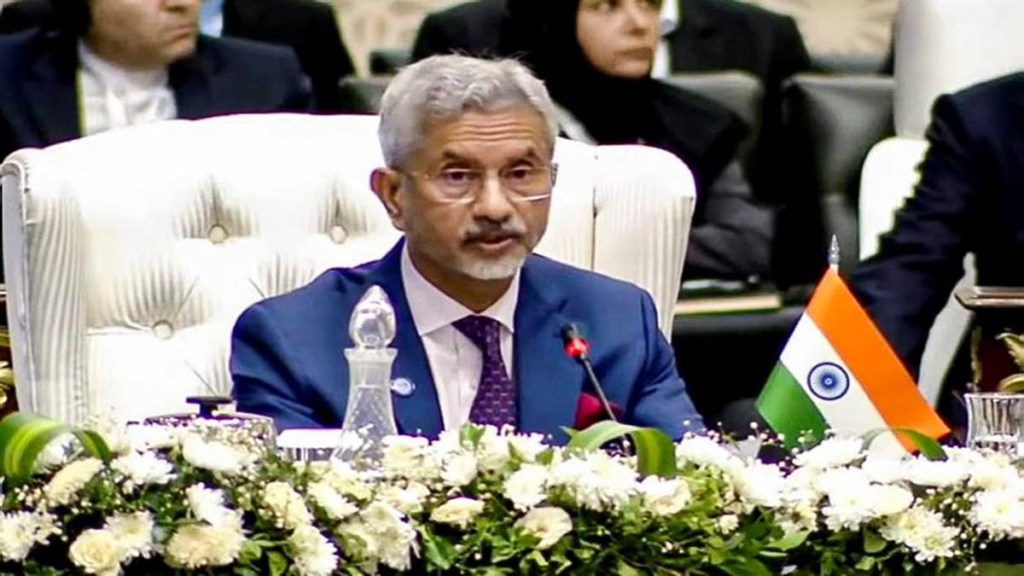India has called for a renewed focus on addressing the pressing challenges of today, from economic instability to climate change, while reaffirming the Shanghai Cooperation Organisation’s (SCO)’s founding principles.
As the world grapples with multiple crises, including two major conflicts and the ongoing impacts of the pandemic, in his address at the SCO Council of Heads of Government, India’s External Affairs Minister S Jaishankar urged SCO member states to enhance cooperation based on mutual trust and sovereign equality, and to focus on the core issues outlined in the SCO Charter.
Strengthening the SCO Charter’s Core Principles
At the SCO Summit in Islamabad he talked about regional cooperation, and good neighbourliness and highlighted that the original goals of combating terrorism, separatism, and extremism remain as vital as ever, warning that a failure to confront these challenges would hinder efforts to promote growth, connectivity, and peace in the region.
He pointed out that these principles were not only essential for regional stability but also for global development. According to him, the SCO’s ability to influence global trends depends on member states reaffirming their commitment to the Charter and engaging in open, honest dialogue about current obstacles to cooperation.
Calls for Genuine Partnerships and Sovereign Equality
Jaishankar was clear in his assertion that cooperation within the SCO should be based on mutual respect and sovereign equality, emphasizing that unilateral agendas or selective practices in trade and transit could undermine regional collaboration. He argued that territorial integrity and sovereignty must be respected, as these are foundational to building trust and achieving collective goals.
He also stressed that development and growth are only possible with peace and stability, which necessitates a firm stance against the “three evils”—terrorism, extremism, and separatism. Cross-border terrorism and other destabilizing activities, he warned, would obstruct efforts to build stronger economic ties and improve people-to-people exchanges.
Seizing Opportunities for Regional Growth
Despite the challenges, he expressed optimism about the potential for SCO nations to enhance cooperation in several key areas. He highlighted industrial collaboration, MSME (Micro, Small, and Medium Enterprises) partnerships, and logistics improvements as opportunities to boost regional competitiveness, expand labour markets, and enhance connectivity. He stressed that collective efforts in energy, environmental protection, and healthcare could have a transformative impact on the region’s economic future.
India’s contributions to global initiatives such as the International Solar Alliance and the Global Biofuel Alliance, as well as its domestic innovations like digital public infrastructure and women-led development, were highlighted as examples of how SCO member nations can work together to achieve mutual benefits. He underlined that cooperative efforts in areas like health, food, and energy security would make all member states more resilient in facing future challenges.
Advocating for Reformed Multilateralism
One of the key recommendations was for the SCO to take a leading role in advocating for “reformed multilateralism.” He reiterated India’s call for comprehensive reform of the United Nations Security Council, particularly regarding the representation of developing nations. He reminded the audience of the July 2024 agreement in Astana, where SCO members recognized the need for the UN to become more inclusive, transparent, and democratic.
Jaishankar made it clear that global institutions must evolve to reflect current realities, and that the SCO must lead in pushing for reforms that make these bodies more effective and representative of the developing world’s interests.
Looking Ahead: The Path Forward for the SCO
In closing, the minister called on member states to acknowledge the constraints on current cooperation and to develop a shared agenda that aligns with the SCO’s founding principles. He urged all parties to renew their commitment to the Charter, stressing that genuine cooperation based on mutual interests is the only way to achieve lasting peace, stability, and development in the region.
India’s message was clear: the SCO has the potential to be a force for global change, but this will only be realized if its members work together in the spirit of partnership, respect, and equality.

